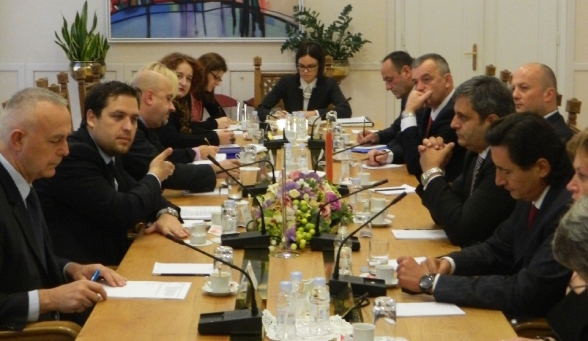Upon the invitation by Mr Daniel Mondekar, the Chairperson of the Committee on European Affairs of the Parliament, the Delegation of the Committee on European Integration is staying in the official visit to the Republic of Croatia in the period from 10 to 12 November.
On the first day of the visit, the Delegation was received by Mr Josip Leko, the Speaker of the Parliament of Croatia, and on that occasion, with mutual pleasure, the good bilateral relations of the two countries were pointed out, reflecting in regular communication of the state institutions in the field of European integration, balanced economic cooperation and cooperation in the field of tourism. The significance of further mutual assistance and joint appearance at the multilateral plan was recognised at the meeting, through various activities at the forums, initiatives, and the international organisations to which both countries belonged. The Speaker Leko pointed out the willingness of the Croatian legislative authority to help its Montenegrin counterpart in further process of negotiations, especially in part regarding parliamentary control of implementing European standards in various fields.
The Delegation of the Committee then met with the Chairperson and the members of the Committee on European Affairs of the Parliament, where the focus of their conversation was on the Croatian experience from the pre-accession period, i.e. on the role of parliamentary working bodies in Croatian negotiation process for the EU membership. On that occasion the significance of protecting the interest of citizens during negotiation process was highlighted, in part in which it was possible, with a visionary view at the direction of future development of the country. The necessity of greater involvement of the parliament in the communication strategy on membership was pointed out, because precisely the lack of awareness of citizens was what contributed to the increased risk of emergence of Euro-scepticism. It was rated at this meeting that regular meetings of the Joint Committee with the European Parliament where the guidelines for further negotiation process were being adopted, represented a significant segment of communication of the national parliament with Brussels, and as such must be put into service of pointing out the results and shortcomings of the negotiation process.
During the day, the Delegation also met with Mr Davor Božinović, the Chairperson of the Interparliamentary Cooperation Committee; Mr Milorad Pupovac, Chairperson of the Foreign Affairs Committee; and Mr Željko Kuprešak, acting Assistant Minister for Foreign Affairs and European Integration. The issues of amending the Constitution during the accession process were pointed out at the meetings, including the challenges brought about by the process, which had no direct link to the implementation of the EU acquis. The MPs were acquainted with the actual support that the Ministry of Foreign and European Affairs of Croatia, through its Centre of Excellence, provided to the countries in the region, including Montenegro.
Day one of the visit was marked by the presence of the Delegation at the presentation of the informative campaign for 2014 European Parliament elections.
The parliamentary delegation consists of the following: Mr Slaven Radunović, Ms Nada Drobnjak, Mr Predrag Sekulić, Mr Šefkija Murić, Mr Srđa Popović, Mr Zoran Srzentić, and Mr Koča Pavlović.









